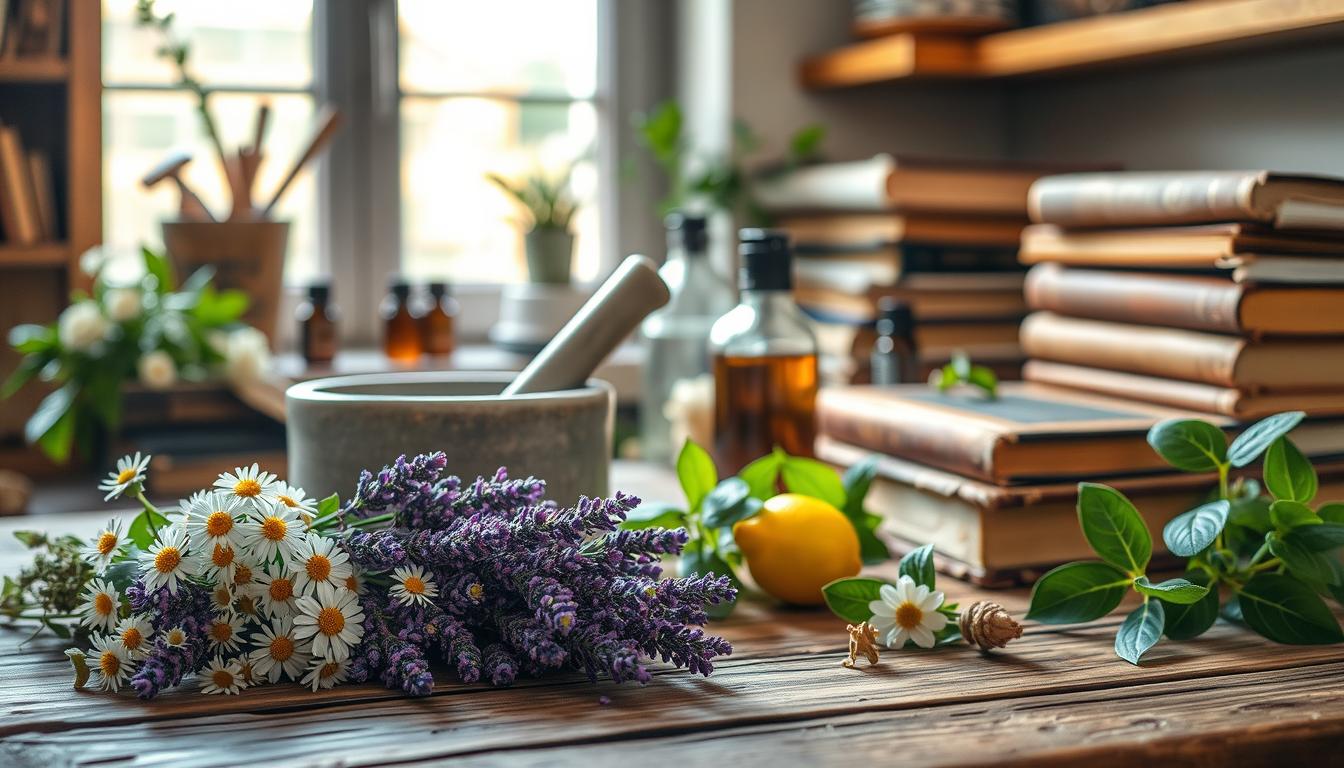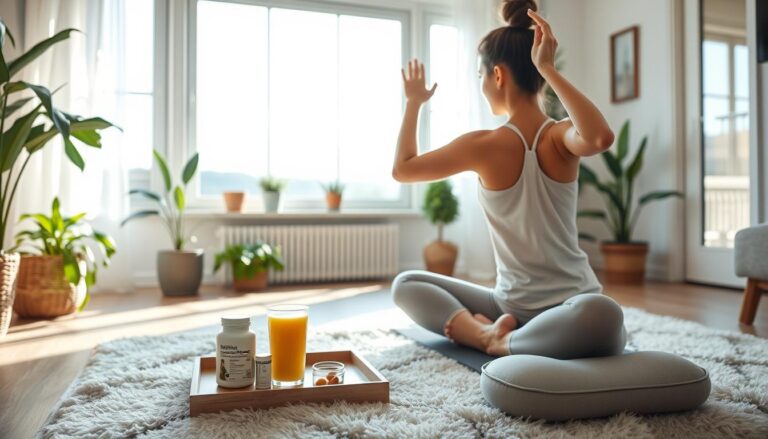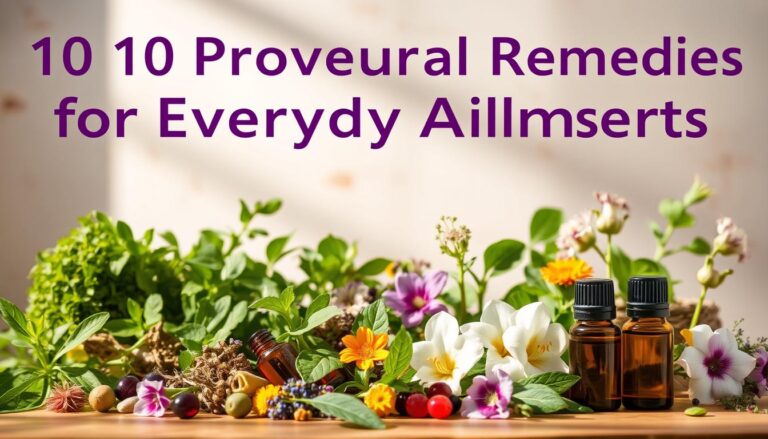Top 7 Herbal Remedies for Stress and Anxiety
In today’s fast world, stress and anxiety are common. Many turn to herbal remedies to help manage their mental health. These natural options are seen as a good complement to traditional treatments.
Modern life’s demands lead people to seek stress relief and anxiety management. Herbal remedies provide a natural way to ease these feelings. They help bring calm and relaxation.
Key Takeaways
- Discover the top 7 herbal remedies for stress and anxiety.
- Learn how these remedies can complement conventional treatments.
- Understand the benefits of using herbal remedies for mental well-being.
- Explore the different ways to incorporate these remedies into your daily life.
- Find out how to start using these remedies for stress relief and anxiety management.
Understanding Stress and Anxiety in Modern Life
In today’s fast world, stress and anxiety are common. Work deadlines and personal tasks can harm our health. They affect both our bodies and minds.
The Physical and Mental Impact of Chronic Stress
Chronic stress can cause headaches, stomach issues, and weaken our immune system. It also makes anxiety and depression worse. It keeps us awake, making sleep hard.
It’s key to know how stress affects us. By understanding this, we can look for ways to reduce it.
Why Many People Are Turning to Natural Solutions
More people are choosing natural ways to handle stress and anxiety. They’re using herbal remedies and mindfulness. These are seen as better than traditional medicines.
This change is because people want lasting solutions. Natural methods are kinder and help us stay healthy for longer.
By trying these natural options, we can manage our anxiety better. This improves our life quality.
The Science Behind Herbal Remedies for Anxiety Relief
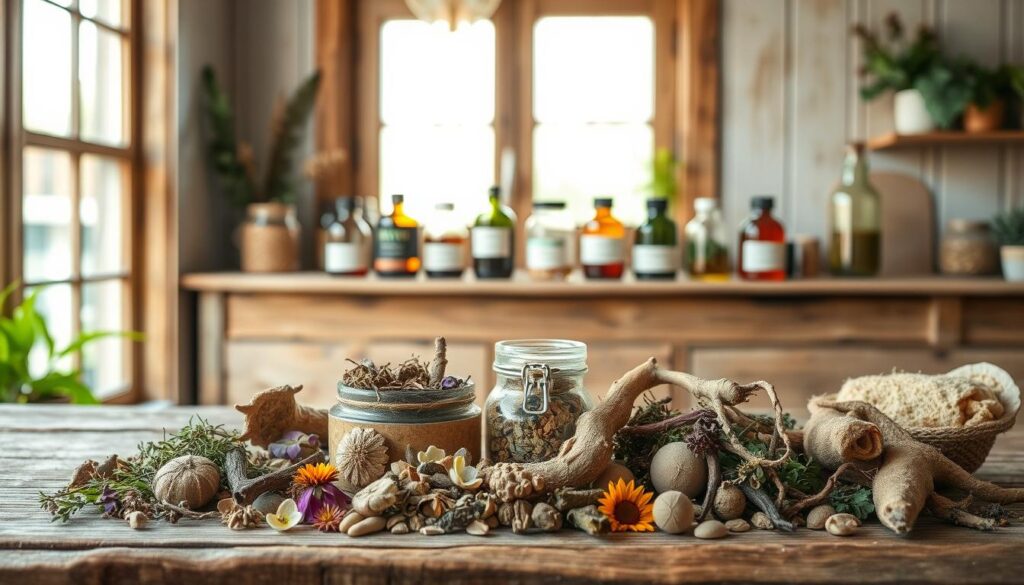
Herbal remedies have been used for centuries to help with anxiety. Modern research is now uncovering how they work. This knowledge helps us understand their anxiety-relieving effects.
How Herbs Interact with Your Nervous System
Herbs interact with our nervous system in complex ways. They often use multiple pathways to calm us down. For example, some herbs have compounds that act like neurotransmitters. These help regulate calmness and reduce anxiety.
Traditional Use vs. Modern Research
Herbal remedies have been trusted for anxiety relief for a long time. But modern research gives us a deeper look. It shows how these herbs can really help with anxiety.
| Herb | Traditional Use | Modern Research Findings |
|---|---|---|
| Lavender | Promotes relaxation and improves sleep | Shown to reduce anxiety by interacting with GABA receptors |
| Ashwagandha | Used as an adaptogen to reduce stress | Found to lower cortisol levels and improve anxiety symptoms |
| Chamomile | Traditionally used for calming effects | Apigenin, a compound in chamomile, binds to benzodiazepine receptors, reducing anxiety |
Knowing both the traditional use and modern research on herbal remedies helps us make better choices. This knowledge can guide us in using them to manage anxiety.
Lavender: Nature’s Calming Agent
Lavender is known for its calming effects and ability to reduce anxiety. It has been used for centuries to relax the mind and soothe the body.
Forms and Preparations
Lavender comes in many forms, making it easy to add to your daily routine. You can find it as:
- Lavender essential oil for aromatherapy
- Dried lavender buds for tea or sachets
- Lavender supplements in capsule or tincture form
Each form offers a unique way to enjoy lavender’s calming effects. You can pick the one that works best for you.
Research-Backed Benefits for Anxiety
Studies show lavender can greatly reduce anxiety. Lavender oil helps relax and improve sleep. Its anxiolytic effects calm the mind and body.
How to Use Lavender Effectively
To get the most out of lavender, use it wisely. Here are some tips:
- Add a few drops of lavender essential oil to your bathwater for a relaxing soak
- Use a lavender-scented diffuser in your bedroom to promote a restful night’s sleep
- Drink lavender tea before bed to unwind and prepare for sleep
By adding lavender to your daily routine, you can reduce anxiety and improve your well-being.
Ashwagandha: The Ancient Adaptogen
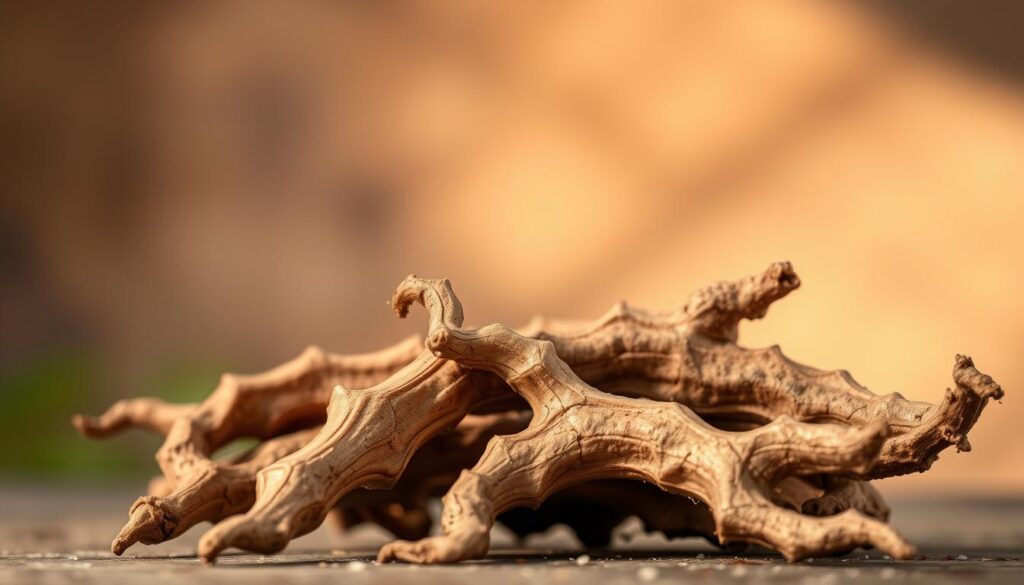
Ashwagandha, also called the “Indian ginseng,” has been a key part of Ayurvedic medicine for ages. It’s a natural way to fight stress and anxiety. This herb helps the body handle stress better.
History and Traditional Applications
Ashwagandha comes from ancient Indian medicine. It was prized for its ability to boost energy and improve thinking. In Ayurveda, it’s called a “rasayana,” meaning it helps keep you healthy and long-lived.
Modern Studies on Stress Reduction
Modern research backs up ashwagandha’s role in stress relief. It lowers cortisol, the stress hormone. It also helps with anxiety and stress in people dealing with chronic stress. Its adaptogenic nature helps the body handle stress better.
Key benefits of ashwagandha include:
- Reduced cortisol levels
- Improved anxiety and stress scores
- Enhanced cognitive function
Recommended Dosage and Forms
Ashwagandha comes in capsules, powders, and teas. The right dose varies by form and need. Usually, 300-500 mg of ashwagandha extract daily is good for stress relief. Always talk to a doctor before starting supplements.
Adding ashwagandha to your daily routine can help manage stress. It supports overall well-being.
Chamomile: More Than Just a Bedtime Tea

Chamomile tea is not just for bedtime. It has many uses beyond helping you sleep. This herb, part of the daisy family, has been calming people for centuries. It’s now known for its stress relief and wellness benefits.
Varieties and Their Properties
There are different types of chamomile, like German chamomile (Matricaria chamomilla) and Roman chamomile (Chamaemelum nobile). Both are known for their anti-inflammatory and antioxidant properties. German chamomile is often chosen for its stronger healing powers.
Evidence for Anxiety Management
Studies show chamomile helps with anxiety. It can lessen anxiety symptoms and improve sleep. The herb’s apigenin helps relax the brain and lower anxiety.
Best Ways to Incorporate Chamomile
Chamomile can be part of your daily routine in many ways. You can drink chamomile tea, take capsules, or use essential oils. Tea before bed helps sleep, while essential oils offer quick stress relief. Capsules are great for managing anxiety.
In summary, chamomile is more than a bedtime tea. It comes in various forms and helps with stress and wellness.
Valerian Root: The Natural Sleep Aid
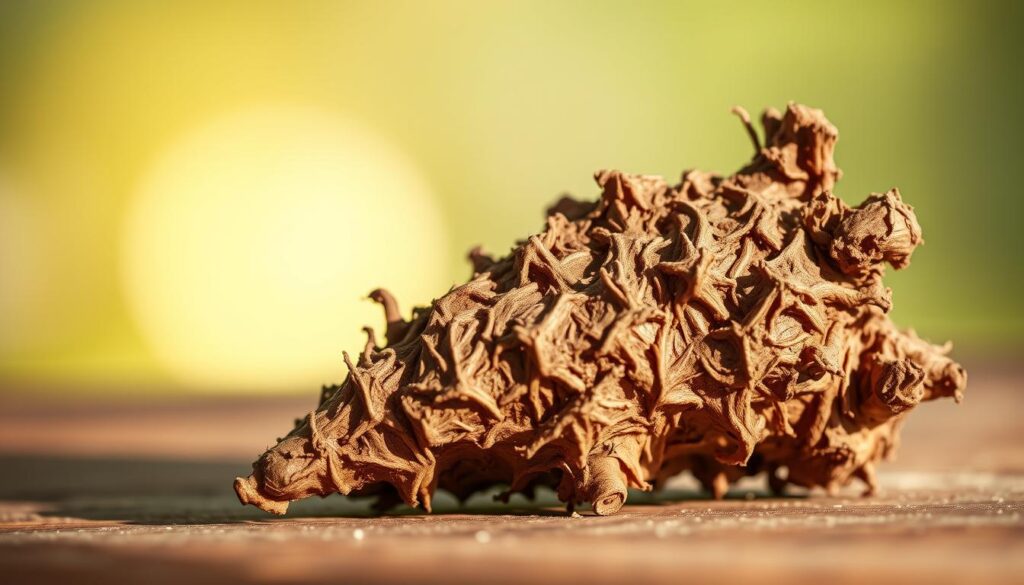
Valerian root is known for helping people relax and sleep better. It’s great for those who struggle with sleep and anxiety. These two issues often go hand in hand, making it hard to find peace.
Connection Between Sleep and Anxiety
Good sleep is key to mental health. Not getting enough sleep can make anxiety worse. Valerian root is a natural way to help with sleep problems, which can also help with anxiety.
The root affects the body’s gamma-aminobutyric acid (GABA) levels. GABA helps us feel calm and relaxed.
How Valerian Promotes Relaxation
Valerian root helps the nervous system work better. It boosts GABA levels, which makes us feel calm. This makes it easier to fall asleep and stay asleep.
Research shows valerian root can improve sleep without the bad side effects of other sleep aids.
Usage Guidelines and Precautions
Start with 500 to 1000 mg of valerian root 30 minutes to an hour before bed. But, everyone reacts differently, so start slow.
Valerian root is usually safe, but it can interact with some medicines. It might also make health problems worse. Always talk to a doctor before using it, if you’re pregnant, nursing, or have health issues.
Adding valerian root to your bedtime routine can help you sleep better and feel less anxious. This can lead to a happier, healthier life.
Lemon Balm: The Mood-Lifting Herb

Lemon balm has been used for centuries to help with mood. It has a light citrus taste and is used in many ways to relax and boost mood.
Historical Use for Nervous Conditions
Lemon balm has long been used to calm nervous issues and help with sleep. Its calming effects make it a favorite for those looking for natural stress relief.
Scientific Support for Stress Relief
Recent studies back up lemon balm’s traditional use for stress. They show it can significantly reduce stress and help with thinking better.
| Benefit | Description |
|---|---|
| Stress Relief | Lemon balm has been shown to reduce stress levels and promote relaxation. |
| Cognitive Improvement | It can improve cognitive function, including memory and attention. |
| Mood Enhancement | Lemon balm is known to enhance mood and reduce symptoms of anxiety. |
Preparation Methods and Combinations
Lemon balm comes in teas, capsules, and tinctures. It’s often mixed with herbs like chamomile and lavender for better relaxation. Experimenting with different preparations can help find the best way to manage stress.
Adding lemon balm to your daily routine could greatly improve your well-being and stress handling.
Passionflower and Kava: Completing Our Top Herbal Remedies for Stress Management
We’re looking at natural ways to manage stress, focusing on passionflower and kava. These herbs have helped people for centuries. They’re known for easing anxiety and helping people relax.
Passionflower: The Gentle Anxiety Soother
Passionflower is a soft but powerful way to ease anxiety. It boosts GABA in the brain, calming the nervous system. Research shows it can work as well as some drugs without the danger of addiction.
Kava: The Pacific Island Stress Reliever
Kava comes from the Pacific Islands and has been used for centuries. It helps people relax and lowers stress. Its active parts, kavalactones, calm the brain’s limbic system, easing anxiety.
When to Choose These Stronger Options
Passionflower and kava are safe and work well for serious anxiety. But, they’re best when other herbs don’t help enough. Always talk to a doctor before using them, if you’re on medication or have health issues.
Knowing how passionflower and kava work helps people choose the right herbs for their stress. They can be part of a bigger plan to manage anxiety.
Safety Considerations When Using Herbal Remedies
Herbal remedies can help with stress and anxiety. But, they also have safety concerns. It’s important to know about risks and how they might interact with other things.
Potential Interactions with Medications
Herbal remedies might not work well with some medicines. Some herbs can make medicines stronger or weaker. This can cause problems.
St. John’s Wort is one herb that can affect many medicines. Always talk to a doctor before mixing herbal remedies with medicines.
Quality and Sourcing of Herbs
The quality of herbal remedies matters a lot. The rules for herbal products are not as strict as for medicines. This means the quality can vary a lot.
Look for products that have been certified by third-party organizationslike NSF or ISSN. These groups check if the product is safe and has what it says it does.
When to Consult a Healthcare Professional
Always talk to a doctor before starting herbal remedies. This is true if you have health issues, are pregnant, or are breastfeeding. A doctor can make sure the herb is safe for you.
National Institutes of Health (NIH), “some herbal supplements can cause serious health problems when taken in large amounts or for long periods.”
So, getting advice from a doctor is key to using herbal remedies safely.
Knowing about these safety tips can help you use herbal remedies wisely. This way, you can enjoy their benefits without risks.
Conclusion: Creating Your Natural Anxiety Management Plan
Incorporating herbal remedies into your daily life can help manage anxiety naturally. Learning about lavender, ashwagandha, chamomile, and others can guide you. This way, you can make a wellness plan that helps you relax and feel less stressed.
To begin managing your anxiety, mix these herbal remedies with a healthy diet, exercise, and mindfulness. A holistic approach to mental health can make you stronger and more balanced.
When trying these herbal remedies, always talk to a healthcare professional first. This is important if you’re on medication or have health issues. With the right advice and dedication, herbal remedies can lead to a calmer, healthier life.

